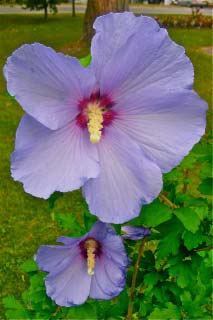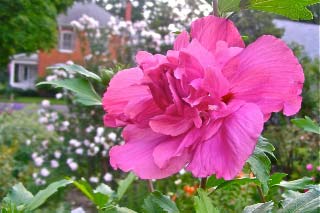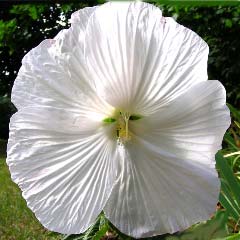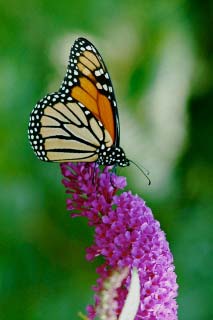Buddleia a butterfly magnet
Donald McClure | Aug 10, 2010 | Comments 5
You could not help but be impressed with the the first butterfly bush (or buddleia) I ever purchased. Standing there in a country nursery in late August, the bush was literally encrusted with butterflies. In fact I had to swoosh a couple of hanging monarchs off to load it in the car.
This fast-growing shrub not only provides a welcome splash of late season colour, but it’s sweet nectar truly does act as a magnet for pollinating butterflies and beneficial bees. In the intervening eight years I have never experienced the host of vibrating wings that were in evidence that day — but we have had many satisfying moments.
One of the main differences I believe is that there are sadly fewer pollinating insects around these days.
Since that original introduction we purchased white, blue and red-pink varieties and found that on any given day in late summer or early fall, nectar-seeking visitors in all of their forms and manifestations visit the inviting flowers for an afternoon treat.
The spicy tiny, highly-scented tubular flowers have four (sometimes 5) petals which combine into a terminal, pyramidal spike from 8 to 20 inches long.
Cultivation-wise the plant does have a few idiosyncrasies. In the spring for, example, it is still napping when everything around it is bursting into new life. In fact so slow is its seasonal response that I have been told by more than one gardener that they had given the root up for gonnersville and groveled it with a fork – before discovering (a lot like myself this spring) that it was still full of life.
Once it does start sending up shoots, it is relentless and will climb to five feet and over with little difficulty. You can hardly blame gardeners for being suspicious of it however, because it is half-hardy and does have difficulty making it through severe winters without some type of protection.
Buddleias are not difficult to grow. They need full sun and fertile, well-drained soil. The Davidii variety needs to be well pruned back in the spring. Deadheading the blooms is said to keep the plant blooming longer.
***

We are indebted to Michael and Lise Noakes for their gift of a scion from their beautiful "Bluebird" Hibiscus syriacus. Donald McClure Photo

Deep rose pink Hibiscus Rose of Sharon is putting out some excellent bloom in its third year in our garden. Donald McClure Photo

Huge dinner plate flower of Hibiscus moscheutos (Disco Belle White) is a spectacular addition to your late summer garden. Donald McClure Photo
Last week we showed you two different types of hibiscus. This week we will show you three more.
Thanks to the generosity of Michael and Lise Noakes of the Yarn Source on Highway 62, we are now the proud owners of a gorgeous little Hibiscus syriacus “Bluebird” which in its sophomore year has produced about two dozen delicate blossoms.
The other two are the double pink “Blushing Bride” and the surprisingly huge Hibiscus moscheutos “Disco Belle White”.
The point is that there are a lot of hibiscus varieties to try. The results of your tenacity can be spectacular for the garden.
***

Delicate rendering of County spring choke cherries is from the skilled hands of Wellington floral artist Margaret McFetridge at the Bloomin' Barn Studio.
County oil and watercolour painter Margaret McFetridge recovering from recent back surgery was kind enough to send
along a couple images of recent work from her Bloomin’ Barn Studio in Wellington. This week we feature a delightful rendering of a County spring choke cherry (Prunus virginiana).
Next week we will take a peek at the intriguing drama of life
in the globe thistle community.
Filed Under: Donald McClure • Uncategorized
About the Author: He can tickle your funny bone or tug at your heart strings. County people may know him as a chronicler of everything that happens (or should happen) in the garden, but his interests stretch across the natural world. His unique sense of observation takes in a wide expanse of living and may even point out some truths about our own condition as managers of the world around us. With Loyalist antecedents in his family tree his roots go deep into the Ontario countryside.




































Great article. For a list of all the BFs that like Buddleia, check out the article from Plant Delights Nursery at the following site (www.plantdelights.com/Catalog/Plants/Genus/Buddleia)
Hi Cy:
Might be a good idea to pile some mulched leaves around the base of your buddleia for the first winter. Otherwise it should be ok. Cut away the old branches close to the ground in the spring — usually after you see the first new shoots emerging. Remember not to give up on this shrub. It is a late starter
and just when you think it isn’t going to make it– it appears,
What protection do you suggest for buddleias. I used to just buy new one each year for the butterflies but finally gave up.
Hi Kelly:
A good question Kelly. Hostas are fairly tolerant of moves but likely do best in early spring. Wait until the first shoots are coming through the ground and cut the cluster of root tubers with a sharp spade. This can be recut into an additional division (or more) if desired. Be sure to plant in good uniformly moist soil and they won’t let you down. Each year you should add a new variety to your garden where space permits to keep your collection vigourous and interesting.
I need some gardening advice Donald. I have some hostas that aren’t happy in their current space – when can I move them without hurting their root system? Thanks so much! Kelly